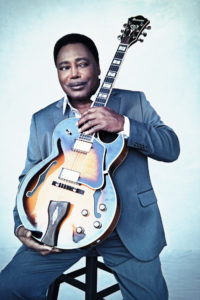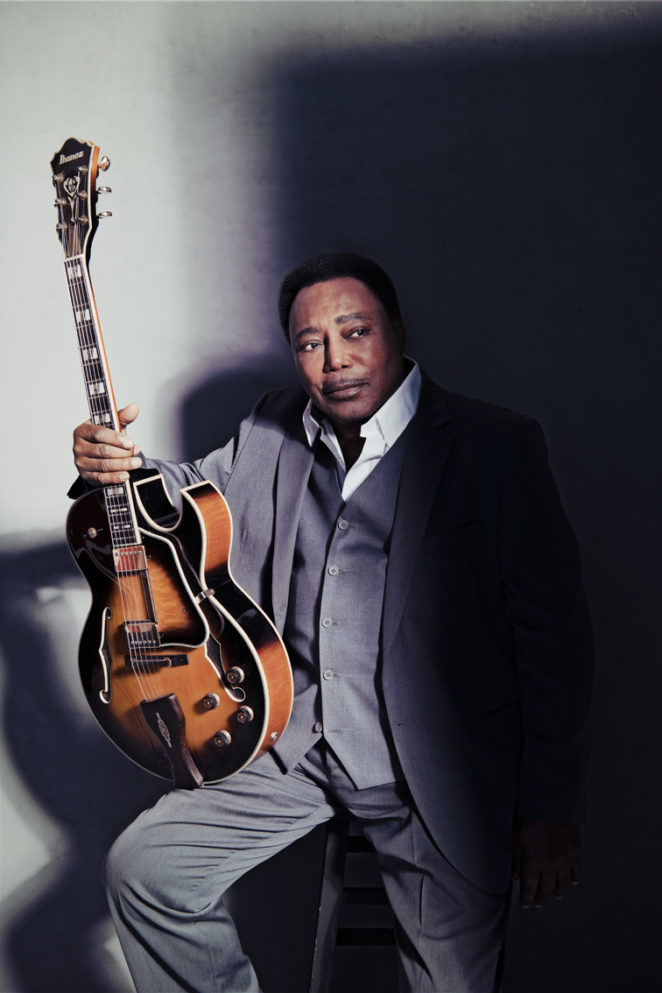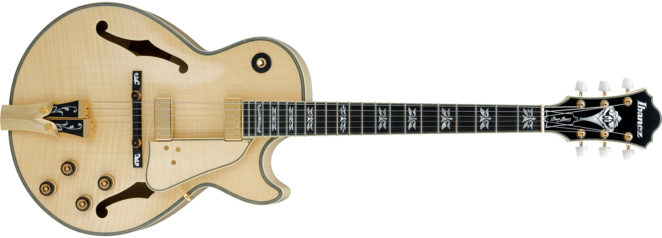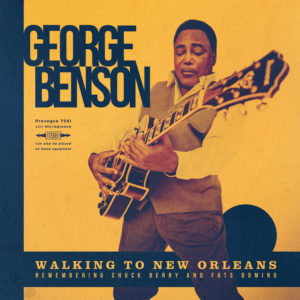GEORGE BENSON: THE BLUESFEST 2020 AUSTRALIAN TOUR INTERVIEW
Inspired by the sounds of his stepfather’s Epiphone Emperor guitar and the guitar licks of jazz greats Charlie Christian and Wes Montgomery, George Benson became enamoured with music and the guitar as a child in the early fifties. Between then and now, in a career spanning more than six decades Benson went on to become one of the greatest guitarists in jazz history and in my opinion, one of the most fluid players of all time in any genre. Not only has George been a superstar in jazz terms, in 1976 his career skyrocketed to yet another level when the breakout album Breezin’ was released. It was the first album in music history to hold the number one spots on the jazz, pop and R n B charts simultaneously. The album won 4 Grammys, including Record of the Year for its single, and sold in excess of six million copies. More success followed with hit singles such as On Broadway, This Masquerade, Give Me The Night, Turn Your Love Around, Love Ballad and numerous others, making George Benson one of the most successful recording artists ever in contemporary music. Far from winding things down at age 76, George has just released a new album Walking to New Orleans, a tribute to Fats Domino and Chuck Berry and is returning to Australia in 2020 to play Bluesfest and sideshows in Melbourne and Sydney.
 AM editor Greg Phillips was thrilled to catch up with George Benson to discuss his career, the new album, his Ibanez GB10 signature guitar, and the upcoming Australian tour.
AM editor Greg Phillips was thrilled to catch up with George Benson to discuss his career, the new album, his Ibanez GB10 signature guitar, and the upcoming Australian tour.
Whereabouts in the world are you at the moment Mr Benson?
I am in Paradise Valley, Arizona, where I have lived for some time now. I like the weather here, there’s sunshine all the time.
You have just released a fabulous new album titled Walking to New Orleans, a tribute to Fats Domino and Chuck Berry. Was the album an idea that you had for a while or an idea someone else had put to you?
It was the idea of the record company themselves. I don’t know why they formed that idea but they thought it would be interesting to do it. So I said OK, I will give it a try and see what happens cos I love those artists too. I’ve been associating myself with their music at this time in my career but at one time in my life, I used to listen to them all the time because they were everywhere. They dominated the radio and the jukeboxes of my era.
Did you ever get to meet Fats or Chuck?
I met Chuck Berry in Los Angeles at a music store very briefly where he was buying strings and picks and things like that. He didn’t know who I was and I didn’t want to bother him but I had to meet him, that was very important.
When you are working on new arrangements of somebody else’s material for a record like this, do you know fairly quickly how you are going to approach each tune or do you experiment with different styles and tempos?
No I very seldom know and that’s good because we don’t want to make the same record over again. What we want to do is something fresh, something that comes from my mind at the moment. That fresh approach to things has worked very well for me. My biggest records have been mostly one takes, sometimes the first take … This Masquerade and Breezin’, On Broadway, they were early takes, we didn’t do them over and over again like how a lot of new records are made. That kept the records sounding fresh and like how we meant to play them as opposed to something we put together over a long period of time.
The producer you worked with on the new album was Kevin Shirley, who is known for producing a lot of rock music records. What was it like working with Kevin on this record?
I had never met Kevin and because of the style of music, I understand why we had never met before but I am glad I met him this time as I respect him as a wonderful producer and I enjoyed working with him.
This was only your second time recording in Nashville I believe?
Yes, the first time was with Chet Atkins at his house and that was a wonderful day too but it was just an off the cuff thing. We were friends and he used to invite me down to restaurants and eat catfish, country food. We had a good time and I respected him and he was one of the greatest guitar players of our time, so it was a privilege for me to go down and hang out with him. We got one or two songs together in his house, he had a great studio but this time with Kevin Shirley, it was a commercial venture with a record company and that was quite a different thing.

Speaking of producers, how important was Tommy Lipuma to your career and how would you describe his production style?
Well I don’t judge them like that. All I know is that he was a very congenial fellow and he brought me great songs, songs I did not think I could perform but what he did was open my mind up to the record industry mentality. While I was trying to think like an African American, he was turning me onto people I had never heard of before … the song This Masquerade and the song Breezin’, I didn’t particularly like that song. I heard it years ago and I didn’t particularly like it at all until I remembered that people loved it. Everywhere that I went he would ask me to play that song and I would always say, nah I don’t want to play that. He said George, I think that people would love to hear you play that! So I reviewed it again in my mind and thought, yeah he’s right people like that song and that’s what we are in this business for, to play for the public. And that’s what a great A&R man does, he connects the audience and the artist through the music. He selects music that he thinks will work in that direction. I owe a lot to Tommy Lipuma.
You are known for your Ibanez GB10 signature guitar. Was that the guitar that you played mainly on this new album?
Yes, I played that guitar and one other guitar, a D’Angelico, one of the originals. I used that on a couple of cuts. It’s not the kind of guitar I play on the stand every day because it lends itself to a much different kind of music but it has a beautiful sound, a beautiful tone to that particular instrument but mostly I used my GB10.
When did your love of hollow-body guitars begin?
From the very beginning. My stepfather, when he met my mother I was seven years old and he brought his Epiphone Emperor, which was one of the top of the line acoustic-electric guitars at that time. I got into that bag way back then because he turned me onto Charlie Christian records and you couldn’t get that sound with a solid body guitar. You had to have a hollow body guitar if you wanted to sound like Charlie Christian, who was playing with the Benny Goodman band at that time. I fell in love with that mentality, that tone, that approach to guitar.
I saw you in a Youtube clip recently playing Charlie’s 1940 Gibson ES250, which was featured in a museum exhibit at the time. I believe you also had a guitar like that earlier on as well?
Yeah, I don’t even know how I got it! At that time I was going through a lot of guitars. Guitars were relatively cheap then. To get one of those guitars now would cost you a fortune. I would go in and I would buy one and then sell it or give it to one of my friends, I didn’t know what I was doing, should have kept it. My children could buy a car with those. That was the mentality at that time. I changed my opinion on guitars. I needed something that had a cutaway in it and the early Charlie Christian guitars did not have a cutaway, so that became important to me. Although I cut a few records with non-cutaway guitars, some of my best records like White Rabbit was recorded with a non-cutaway Charlie Christian style guitar.
You have released 45 studio albums. What do you know now about getting a good guitar sound on record that you didn’t know the first time you recorded?
That the sound could be altered by the engineer. At first, I did not like my recording sounds. After the original ones I did with CBS, I liked those recordings. After that, I’d go into the studio and begin to hear a guy I did not recognise. It didn’t sound like me anymore, so I had to adjust my thinking in order to make records because engineers didn’t want to hear anything I had to say. Nothing I would say to them would make them change their mentality, they didn’t know what I was talking about. Finally, I got the sound I wanted again when I recorded the album Breezin’ with Warner Brothers under Tommy Lipuma and the great engineer Al Schmitt. He listened to what I was saying and he altered my sound to make it sound natural. I also had new equipment. I went in with a Johnny Smith guitar and a Polytone amplifier and man, that put me right on the street where I should be living. It was wonderful.

The folks at Ibanez keep honouring you, more recently with a 30th and then 40th anniversary model of the GB10. What are the key elements that they had to get right for you to put your name on that guitar?
Well, I designed the original. I have designed maybe about eight guitars for Ibanez over the years. The main thing with those, in the beginning, was the size, which was highly unusual at that time, a mid-sized guitar. It was not popular when it first came out, although I did design a standard, regular guitar for the rest of the world, a standard jazz guitar. The little one was unique, the GB10 was a very unique guitar. Although jazz players liked my GB20 which was a standard size, it was the GB10 which took off. They’d begin to examine it, pick it up and say OK, this is a good road guitar. For me, that’s what it became, it became the perfect guitar to take on the road. When I sang it did not cover my whole body like the country players’ guitar, you know nothin’ but a piece of wood in front of me, a big piece of wood with a hole in it! It was small and I could swing it around very easily, it was not cumbersome and it never broke down on me and even if it hit the floor, I could pick it right up off the floor and play it and often it wouldn’t even go out of tune. So that was very important to me.
Although jazz players liked my GB20 which was a standard size, it was the GB10 which took off. They’d begin to examine it, pick it up and say ok, this is a good road guitar. For me, that’s what it became, it became the perfect guitar to take on the road.
I read that Peter Frampton was an influence on you, could you elaborate on that?
First of all, I liked the impression that he had on his audience. They didn’t forget him easily, he recorded music that was very memorable. To me, in the beginning, he was just a name. They’d tell me the top rock guitar player in the world’s name is Peter Frampton. I said I’d never heard of him. One day I saw his name in a magazine article so I picked it up and read the article and he said, oh I listen to George Benson’s music and said whaaat? You mean the top rock guitar player in the world listens to my music? I read the article and then I examined his records to see what kind of sound he had. I liked the records, he was on the right track. I liked his stuff, he was playing stuff that was different from everybody else. I said you know what, I am going to try that on my next record, so I used percussion and a wah-wah guitar and it was very successful, we went over the 100,000 album mark, which was very difficult with the record company I was with, as they had no distribution as I understood it at the time. When Warner Brothers heard that I had sold 100,000 albums or more, they said man if that record had of been with our company, it would have sold 500,000 albums, which would have made it gold. So the head of the record company put out the order that he wanted George Benson on this record company yesterday! That’s how I got on Warner Brothers records, so Peter Frampton was very important to my movement in the world of music. I met him later and he’s a very nice person, still is today.
You are coming back to Australia in 2020 for Bluesfest and some sideshows. Will your band be the same one that you took to Europe and the UK recently?
Most definitely. I don’t go anywhere without my tools and they’re part of my tool chest brother. They know what I am going to play before I play it. Basically they don’t know what order the songs are going to be in but they know the structures and they know what I am looking for. If I pick a song, even if they have never heard it before they would know what it is I am expecting them to do. That puts us on the same page and makes us sound good to the audience and that’s what is important for me, we connect with the audience.
Tell me about Stanley Banks, you have had him as your bass player for a long time. What is it about Stanley’s bass playing that you enjoy?
When I met him he was a kid, only 23 years old and that was 43 years ago. He knocked me out in a sense that … he studied classical bass, upright bass for a while. He had good energy and he plays bottom. You know today a lot of bass players want to play like they do on a guitar. I don’t want anyone playing my guitar for me, I want them to play the bass. Stanley Banks does that very well and he has been on a lot of my hit records. I can say it best by saying this … when my career became very popular, selling records in the millions, every now and then someone would come to me and say man, why do you have Stanley Banks in the band, I know guys who could play rings around Stanley Banks. I said to them, you know I have played with the greatest bass players of our time and I know the greatest bass players of our time. I knew James Jameson, he was my friend. I also played with the number one bass player on earth which is Ron Carter, who plays upright bass. I have played with a lot of wonderful bass players in jazz history, played with ‘em all. I always say, which one of them has sold 20 million albums and they couldn’t answer that question, there was no comeback with that. And I don’t want a bass player that if you offered them ten dollars more, they’re gone. If you get a prima donna, you know… man that bass player is wonderful, I wonder if I can steal him from George Benson’s band if I offer him ten dollars more than George. You don’t want that in your band either! So I have always had Stanley Banks and he plays well and we have sold a lot of records together and we are very good friends, which is the thing that is more important than anything.
 How do you go about approaching your set list for a tour like the upcoming Australian one?
How do you go about approaching your set list for a tour like the upcoming Australian one?
We know there are songs in the set that we have to play or the audience will be very angry at us. They are in there but they are not in an order that the band knows because the band will go to sleep if they did. If you put a set list with all the songs you want to play, they’d go to sleep and play with their eyes shut and you don’t want that. They know they are going to play On Broadway, they know they’re going to play Breezin’, and whatever else on the list that is necessary. But you know something, they’re not mad and they don’t get mad playing them and neither do I. I always told myself, If I ever got a hit record … cos I know some of my friends wouldn’t do that, they would not play their hit record, they would get tired and they’d tell their audience, we’re not going to play that song, we’re tired of that. I thought that was terrible. You’ve got to remember even though they have been on the road ten, fifteen, twenty years or more, some people have never heard them live and you can’t disappoint them. And If a person has come to your concert many times, they are coming because of those songs. So it is better for me to form the opinion that hey, I like those songs too, after all I wouldn’t be here without them and that’s my mentality.
I’m wondering about future projects. A lot of people like your instrumental records, do you think you’ll ever record another one
We never know what is going to happen next but I would not turn it down because you know I love instrumentals and my guitar is still waiting for me to tell it what to do. I practice just about every day on my guitar, so I would not turn it down. I would love to do a great instrumental album, so don’t rule it out.
Bluesfest 2020 is being held from 9 – 13 April 2020. Tickets are on sale now via Moshtix.
George Benson Side Shows
Sat 4 April, State Theatre Sydney
Tickets via Ticketmaster
Wed 8 April, Palais Theatre Melbourne
Tickets via Ticketmaster
- Josie Morrison






Comments 0